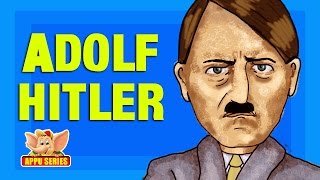
12 Things You Didn't Know About Hitler 12 Things You Didn't Know about Adolf Hitler, the notorious dictator! He is perhaps the worst monster in world history. Millions died and million more fled ...
(Image by YouTube, Channel: APPUSERIES) Details DMCA
"...The more [a person] gains freedom and the more [he or she] becomes an individual, [humans have] no choice but to unite themselves with the world in the spontaneity of love or work -- or else to seek a kind of security by such ties with the world as destroy [their] freedom and the integrity of [the] individual self."
Erich Fromm
Introduction
That we live in uncertain and troubling times is obvious.
Examples: Our current hubristic life orientation is creating"
the destruction of the rainforests, massive species extinction, overpopulation, refugee issues, pollution, soil erosion, the impending end of cheap oil, the ever-widening rift between the very rich and the poor, corporate control of governments, the potential for nuclear devastation, the global uncertainty regarding how to dispose of nuclear waste, radical climate change, perilous resource depletion, 9/11 and growing doubts concerning the origins that event, the possibility of actual terrorist attacks, and of course, both the realities and ongoing questions concerning Covid-19.
There is much anxiety - both at the conscious level and below the surface.
The chaos which seems to be everywhere is ripe for both authoritarianism, and its virulent subtype - fascism - to take root. Covid-19 alone has fostered a sense of both isolation and powerlessness. At confusing times like these, we can't help but crave stability. "Law and order" strongmen and authoritarian governments are more than willing to provide it: "Just do what you are told, don't ask uncomfortable questions and everything will be alright." Donald Trump is happy to fulfill this role. Will the American people choose to re-elect him to do so?
Erich Fromm states:
"Modern man still is anxious and tempted to surrender his freedom to dictators of all kinds, or to lose it by transforming himself into a small cog in the machine."Escape from Freedom
In his 1941 book Escape from Freedom, Erich Fromm, a Jewish psychoanalyst who fled Germany, offers a psychological history of the social conditions that developed in Europe between the Middle Ages and the mid-20th century, and which culminated in the rise of the Nazi Party under Adolf Hitler. Fromm sought to analyze the illness of contemporary civilization in light of its willingness to submit to totalitarian rule.
The underlying question of Fromm's work is how the German people allowed Hitler's totalitarian regime to gain power both by default and with their enthusiastic support. A secondary question asked by Fromm is whether or not democracies, such as those found outside of Germany, can make a people immune from similar developments.
Fromm traced the roots of Nazism to the traumatic cultural, economic, and political upheaval that occurred in the transition from the Middle Age feudalism to the modern world. His analysis showed how the emergence of Protestantism and capitalism profoundly impacted the human psyche, leaving Europeans feeling homeless and without a sense of mooring.
Fromm's contention is that, while many constraints were removed, the severing of what he calls "primary bonds" left a multitude of people feeling alone and seeking "secondary bonds." During the Middle Ages, your birth determined your social status; one had an unquestionable place in a fixed order. With the emergence of capitalism people were no longer bound in the same way to fixed economic classes. The end of feudalism and Industrial Revolution turned the economic system upside down, and the Reformation changed both religion and the established social structure.
(Note: You can view every article as one long page if you sign up as an Advocate Member, or higher).




